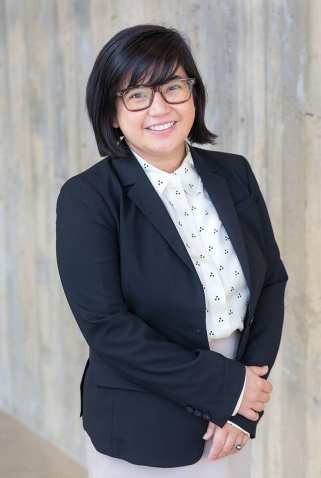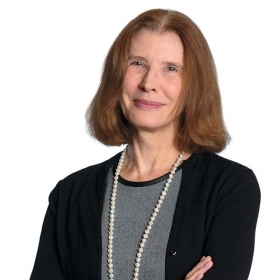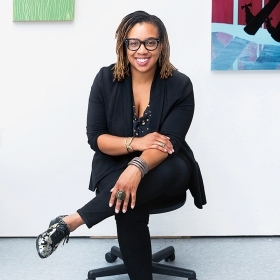Photo by Lisa Abitbol
The Democratic presidential candidate debates were not on the syllabus of Genevieve Clutario’s fall course, The Asian-American Experience. But with a record number of Asian-Americans and Pacific Islanders vying for the nation’s top position—three at this writer’s deadline—it is not surprising that they sparked classroom discussion. In particular, when candidate Andrew Yang quipped at a debate last September in Houston, “I’m Asian. So I know a lot of doctors,” it drew a lot of laughter in the audience, as well as a lot of heat on social media. Yang, who is Taiwanese-American, came under fire for leaning into racial stereotypes about his Asian-ness. His biggest applause line is, “The opposite of Donald Trump is an Asian-American man who loves math,” and his campaign sells baseball caps that read simply: MATH.
“[The students] bring up things that they hear in the Twitterverse. That is something new for me,” says Clutario, Andrew W. Mellon Assistant Professor of American Studies. She nonetheless incorporated their questions into one of the topics central to the course: the model-minority myth.
“So I asked them, ‘Do you know what the model-minority myth is?’ A lot of the students shared their own experience with the model-minority myth. Then we looked into the longer history,” she says. Clutario had her students read contemporary online essays about Yang’s comments in Medium and Vox. They analyzed a Time magazine cover from the 1980s depicting several young Asian-Americans, titled “Whizkids.” Then they went back even further to an article from the late 1950s where the phrase “model minority” was first used in regard to Japanese-Americans. “The students were great about being super-critical about why it’s called a myth, and how sometimes even positive stereotypes can be harmful to people, and what is a stereotype and how is it used.”
Pulling from a range of sources—from the personal to pop-cultural to academic—is not only a feature of Clutario’s teaching style, but of her academic research and education path as well.
“I feel like my academic journey took a long time, but it makes sense because it was so interdisciplinary,” she says. Clutario holds degrees in comparative literature, film and media studies, and history, and accepted an appointment in American studies at Wellesley this fall after previously being on the faculty at Harvard.
Her research focuses on questions of gender, race, and empire building in the Philippines, and she is currently at work on a book, Beauty Regimes, that uses fashion, beauty pageants, garment work, and embroidery to address those questions. This is an academic inquiry sparked, in part, by Clutario’s experience growing up as part of the Filipino diaspora in the Los Angeles area and her mother’s abiding interest in Filipino beauty queens.
Clutario hopes that this same interdisciplinary approach will help her students answer the burning questions they bring with them to class. “The students come in with so many questions,” she says. “I hope that I give them the tools to find those answers in different fields: history, sociology, media, and take those skills to understand their own place in the world.”








We ask that those who engage in Wellesley magazine's online community act with honesty, integrity, and respect. (Remember the honor code, alums?) We reserve the right to remove comments by impersonators or comments that are not civil and relevant to the subject at hand. By posting here, you are permitting Wellesley magazine to edit and republish your comment in all media. Please remember that all posts are public.